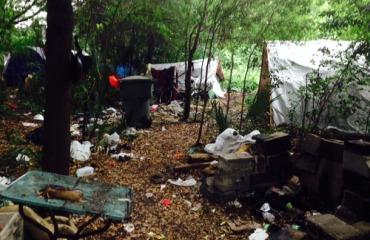
Caption
A wooded camp for unhoused people during the 2010s is seen. Homelessness is an increasing problem in rural as well as urban areas.
Credit: File photo

A wooded camp for unhoused people during the 2010s is seen. Homelessness is an increasing problem in rural as well as urban areas.
ATLANTA — Though many associate homelessness with urban centers, the problem of lack of housing is more widespread, speakers said at a recent state Senate hearing on homelessness.
Rising rental prices and wages that have not kept up have pushed some Georgians out of their homes, experts and local observers alike affirmed.
Federal data shows that there are around 10,000 homeless people in Georgia. Around one-third of those people are located outside of Georgia’s cities.
A person would need to earn $14.24 an hour to be able to afford a two-bedroom apartment outside of Georgia’s cities, according to the National Low Income Housing Coalition. That’s nearly double Georgia’s minimum wage of $7.25 an hour.
Georgia is short by around 207,000 affordable and accessible rental units, according to the group.
The housing crunch is not always as visible in rural Georgia as in Atlanta, said Dr. Bambie Hayes-Brown, CEO of Georgia Advancing Communities Together, a statewide coalition of affordable housing groups.
But the problem is real in rural areas, too.
Hayes-Brown’s organization sponsored a series of meetings around South Georgia to learn more about people’s experiences.
“People are doubling and tripling up,” she said, referring to a practice where families or individuals share housing in close quarters to help make ends meet.
Some people also live in tent encampments in forested or other out-of-the-way places in rural Georgia, she said.
Another concern is the lack of emergency shelters and other places for people to live when getting back on their feet, Hayes-Brown said.
There are around 3,000 emergency shelter and transitional housing beds and around 3,600 more permanent supportive housing spots in Georgia outside of the larger cities, according to the latest data from the federal Department of Housing and Urban Development.
But those supports are not always available where and when they are needed.
Cedartown in Northwest Georgia lacks a true homeless shelter, said John Winecoff of Community Share Ministries.
Winecoff runs a small, specialized program to help men get on their feet — but that can’t stem the tide Cedartown is seeing.
“Recently, we’ve had an upsurge of homeless people,” Winecoff said. “Places to live … have become unaffordable.”
There’s also a lack of jobs in the area. Some homeless people are struggling with addictions to opioids, alcohol, or methamphetamines. Others are just passing through, often on their way to Atlanta, and get stuck in the area, Winecoff said.
“There’s not many resources for someone to turn to in Cedartown,” he said. “Some have no choice but to sleep in the woods.”
Winecoff said many homeless people lack basic identification documents that would help them get services or find a job, so his organization tries to help.
“There’s no way to get [an ID]” if you live in the woods, he said.
Small cities are facing similar problems, said Gainesville Chief of Police Jay Parrish, who has noticed an uptick in homelessness over the past three to five years.
“In simple economics, the increased demand for housing coupled with a decreased supply created a higher market price for housing,” Parrish said. “Affordable housing is more difficult to come by. This has left many of our population homeless.”
Parrish’s police department and community groups are acutely aware of the problem, he said, and they work together to connect people with resources.
Yet so far there’s been no magic-bullet fix to the root problem, the lack of affordable housing, Parrish said.
Far to the south, in Fitzgerald, Lethia Kittrell said people are sleeping in public places, camping in the woods, and staying in a local homeless camp.
Kittrell, CEO of the nonprofit Fitzgerald for Change and a Democratic candidate for the state House of Representatives, said her area lacks resources to address the problem, and she wants to fix that.
An influx of people from larger cities attracted by low — at least, to them — housing prices is contributing to the housing shortage, Kittrell said.
Even substandard units are much more costly than they used to be, Kittrell said, and she’s “majorly concerned” about safety in some housing units. Some people are struggling to meet higher energy bills and housing costs at the same time.
And Kittrell said there are many eviction cases pending in the courts.
Both Kittrell and Hayes-Brown said people working to solve the housing problem in small towns often feel disconnected from the financial and political resources of the big city.
Hayes-Brown pointed out that a small investment could make a big difference in a rural area.
There are a number of steps local and state policymakers can take to address homelessness, said Sarah Saadian, senior vice president of public policy at the National Low Income Housing Coalition.
Federal COVID relief funds could be used to help build affordable units and provide rent support, she said.
Municipalities can consider changing zoning laws to allow for more dense housing, such as multi-family units.
Some cities have banned landlords from asking how people will pay for a rental unit in an effort to stop discrimination against those relying on housing vouchers, Saadian said.
The federal government has a role to play as well. Though there is a federal rental assistance program, it only serves one in four people who need it to access affordable housing. More funding could increase the number of people helped, Saadian said.
A state Senate study committee on homelessness chaired by Sen. Carden Summers, R-Cordele, held its first meeting earlier this month. Advocates from both Atlanta and smaller towns across the state testified. The committee will meet again this fall.
This story is available through a news partnership with Capitol Beat News Service, a project of the Georgia Press Educational Foundation.